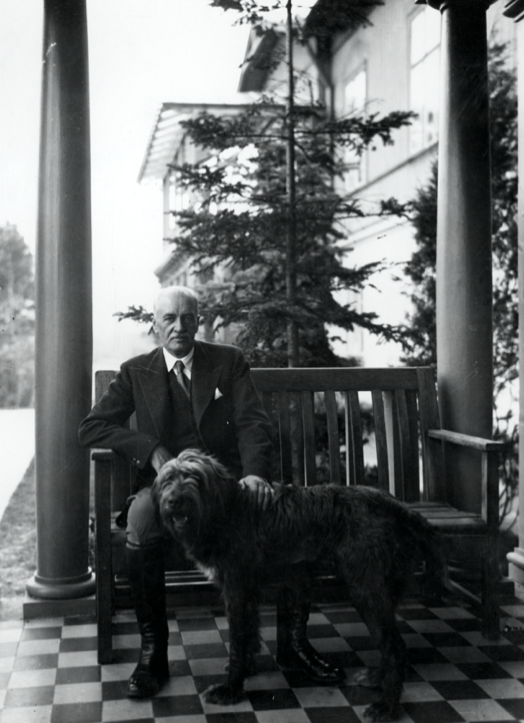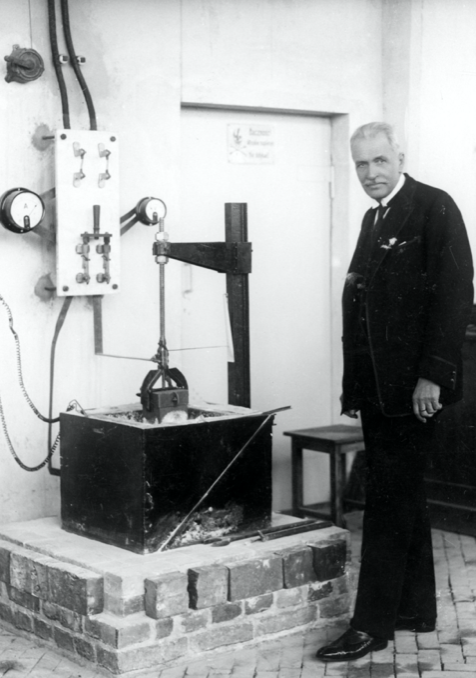Independent Poland 1918-2022
Ignacy Mościcki achieved significant successes in several areas of activity. He was a committed activist, a political refugee, a talented chemist with numerous foreign patents, a factory administrator, a co-founder of a scientific institute and a mining company, an academic lecturer and rector of a university, and finally the President of the Republic of Poland. His successes would be enough to fill several biographies.
Ignacy Mościcki was born in Mierzanów in 1867. Initially, he was associated with the socialist movement. After graduating from school in Warsaw, he studied chemistry at the Riga University of Technology. There he joined the Polish underground left-wing organization Proletariat. After graduating from school, he returned to Warsaw, but because of his independence activities, he was hunted by the tsarist secret police. He was threatened with life imprisonment and exile to Siberia, which forced Mościcki to move in 1892. to London. In 1896. he was offered a position as an assistant at the University of Freiburg (Switzerland). It was there that he patented a method for the low-cost industrial production of nitric acid. In 1912, Mościcki moved to Lviv in the Kingdom of Galicia and Lodomeria, i.e. in the Austro-Hungarian Empire, where he accepted a professorship of physical chemistry and technical electrochemistry at the Lviv Polytechnic. In 1925 he was elected rector of the Lviv University of Technology, but soon moved to Warsaw to continue his research at the Warsaw University of Technology.
Fig. National Digital Archives
After Józef Piłsudski’s May coup in 1926. Mościcki – Piłsudski’s former partner in the Polish Socialist Party – was elected president Polish, June 1, 1926 (after Piłsudski resigned from office). After the death of the Marshal in 1935. Piłsudski’s supporters were divided into three main groups: those who supported Mościcki as Piłsudski’s successor; those who supported General Edward Rydz-Śmigly and those who were closest to Prime Minister Walery Sławek.
Mościcki remained President of the Republic of Poland until September 1939, when, at the outbreak of World War II, he was interned in Romania and forced to resign by the French government. While in exile, he handed over the office to Władysław Raczkiewicz. In December 1939, with the consent of the Romanian authorities, Mościcki moved to Switzerland, where he lived during World War II. He died at his home near Geneva on 2 October 1946.
The initiative with which he is associated today is the investment foundation in the Second Republic of Poland for the creation of a giant on the chemical market – Grupa Azoty. It was on the initiative of the President of the Republic of Poland, Ignacy Mościcki, in 1927. The State Factory of Nitric Compounds was established in Tarnów.
 Fig. National Digital Archives
Fig. National Digital Archives
Did you know?
- To this day, Ignacy Mościcki remains the longest-serving president in the history of Polish.
- Poland owes Mościcki as many as 40 patents, which he handed over to the Polish state free of charge after taking office.
- As a scientist, he specialized in electrochemistry, and thanks to his research on electricity, he became a world authority in this field at the beginning of the twentieth century. As a technical manager at the Société de l’Acide Nitrique (which funded his research), he was the author of a method for producing nitric acid, which involves fixing nitrogen from the air using electricity. To this end, Mościcki personally constructed and patented high-voltage capacitors, which were not produced at the time, and whose value was estimated at one million francs.
- In 1907, his devices were used in the transmitting mechanisms on the Eiffel Tower, in the largest capacitor bank in the world. The Polish inventor also won the recognition of Albert Einstein (who was then an expert of the patent office) for developing a technology for the reaction of oxygen and nitrogen in an electric arc, using a rotating flame in a magnetic field, used to obtain nitrogen from the atmosphere.
- He was the author of over 60 scientific papers.
- Being a poor hairdresser’s assistant, he did not accept tips, considering it dishonorable. He claimed that the salary paid to him was sufficient.
- Unfortunately, he invested his money in a kefir factory, which, as it turned out later, was not worth the money he paid for it.
- After Poland regained its independence, Mościcki founded a fertilizer factory in Chorzów, where his invention increased productivity by 150%.
Learn more
Sport after regaining independence
Origin:
https://www.biogramy.pl/a/biografia/ignacy-moscicki-prezydent-wiesz
https://dzieje.pl/postacie/ignacy-moscicki
https://ciekawostkihistoryczne.pl/leksykon/ignacy-moscicki-1867-1946/





